Table Of Contents
- 1 Why Is It Important To Clean Solar Panels?
- 2 What Are The Risks Of Not Cleaning Solar Panels?
- 3 How Often Should Solar Panels Be Cleaned?
- 4 What Is The Best Time To Clean Solar Panels?
- 5 What Tools Are Needed To Clean Solar Panels?
- 6 What Is the Best Method for Cleaning Solar Panels?
- 7 What Precautions Should be Taken When Cleaning Solar Panels?
- 8 Are There Professional Services Available For Cleaning Solar Panels?
- 9 What Are Some Tips For Maintaining Clean Solar Panels?
Are you maximizing the efficiency of your solar panels? Regular cleaning is crucial to ensure optimal performance and longevity.
In this comprehensive guide, we will explore the importance of cleaning solar panels, the risks of neglecting maintenance, and the best methods for keeping your panels spotless.
Discover how often to clean your solar panels, the necessary tools for the job, and essential precautions to take.
Stay tuned for expert tips on maintaining clean solar panels and the option of professional cleaning services.
Learn more: How To Fix Solar Panels
Why Is It Important To Clean Solar Panels?
Ensuring that your solar panels are clean is crucial because dirt buildup can significantly reduce their efficiency by blocking sunlight, which is essential for optimal energy production.
When dirt, dust, or other debris accumulate on the surface of solar panels, they create a barrier that reduces the absorption of sunlight, leading to lower electricity generation. Clean solar panels can capture more sunlight and convert it into energy more effectively, maximizing the system's output.
Maintaining cleanliness also prolongs the lifespan of solar panels, as the accumulated dirt can cause irreversible damage over time. Regular cleaning not only ensures peak performance but also helps in identifying any potential issues early on.
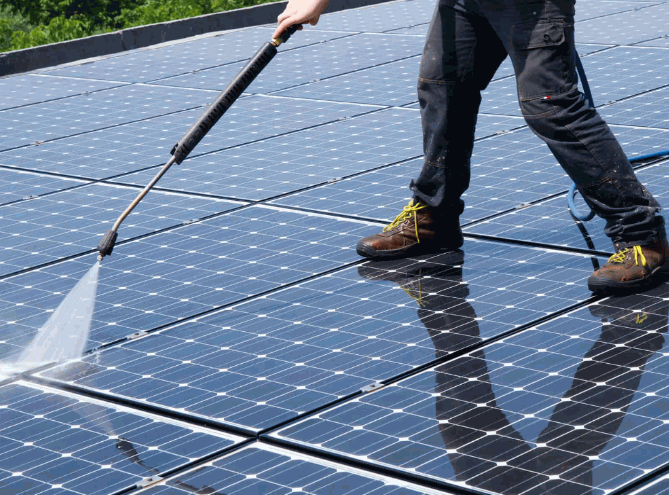
What Are The Risks Of Not Cleaning Solar Panels?
Neglecting to clean your solar panels can lead to decreased efficiency, higher energy bills, and potential issues with the product warranty due to dirt and debris obstructing sunlight.
When solar panels are not properly maintained, the accumulated grime and dust can act as a barrier, preventing sunlight from reaching the photovoltaic cells. As a result, the panels produce less electricity, causing a drop in their overall efficiency. This drop in efficiency translates to higher energy bills as the system must work harder to generate the same amount of power.
Along with increased costs, failing to clean solar panels regularly can also lead to potential long-term damage. Dirt buildup can cause hot spots on the panels, affecting their performance and lifespan. This damage not only impacts the panels but can also void the product warranties provided by manufacturers.
How Often Should Solar Panels Be Cleaned?
The frequency of cleaning solar panels depends on factors like location, weather conditions, and the amount of dirt buildup, but regular maintenance is generally recommended by solar companies to ensure optimal performance.
Most experts suggest that solar panels should be cleaned at least every 6 months to maintain efficiency. In areas with high levels of dust, pollen, or bird droppings, more frequent cleaning may be necessary. It is important to consider the local climate as well.
For instance, regions with frequent rain may naturally help rinse off dirt, reducing the need for manual cleaning. On the other hand, areas close to industrial zones or highways may require more frequent cleaning due to pollution.
What Is The Best Time To Clean Solar Panels?
The best time to clean solar panels is early in the morning or late in the afternoon when the sunlight is not too intense, which helps in maximizing cleaning efficiency and safety.
During these times, the angle of the sun's rays is less direct, reducing the risk of overheating the panels or causing damage to the delicate components.
Cleaning solar panels during peak sunlight hours can not only be less effective due to the rapid evaporation of water and cleaning solutions, but it can also pose safety hazards such as burns or glare from intense rays.
This is why experts recommend scheduling panel maintenance during the cooler hours of the day to ensure optimal results.
What Tools Are Needed To Clean Solar Panels?
To efficiently clean solar panels, a variety of tools are required as part of a solar cleaning kit, including a soft brush, non-abrasive sponge, mild detergent, and a hose or pressure washer to ensure proper solar panel maintenance.
Soft-Bristled Brush
A soft-bristled brush is essential for gently removing dirt and debris from the surface of solar panels without causing any scratches or damage.
Using a soft-bristled brush ensures that the delicate surface of the solar panels remains unharmed during the cleaning process. The soft bristles effectively dislodge dirt and grime without compromising the integrity of the panels. Unlike harsher brushes which can leave scratches or degrade the protective coatings, a soft-bristled brush provides a gentle yet thorough cleaning solution.
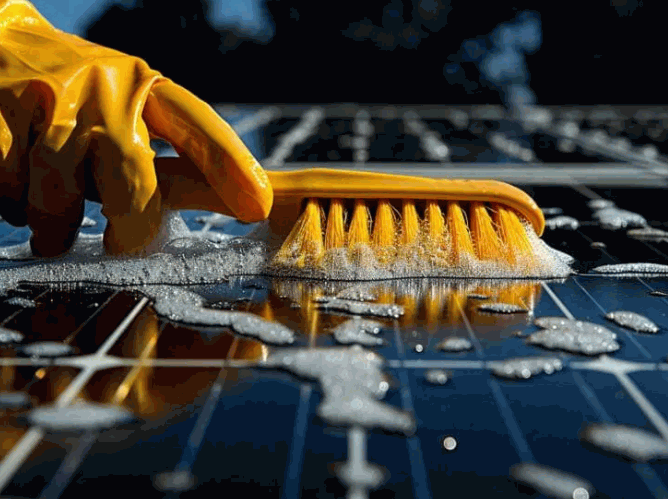
Non-Abrasive Sponge
Using a non-abrasive sponge along with a mild cleaning solution helps in gently clean the surface of solar panels without causing scratches or damage to the glass.
When cleaning solar panels, it is essential to use materials that are gentle yet effective to ensure optimal performance of the panels. Non-abrasive sponges are perfect for this task, as they can remove dirt, dust, and other residues without leaving any marks or scratches. By combining the sponge with a suitable cleaning solution, you can easily tackle stubborn stains and grime without harming the delicate surface of the panels. This approach not only maintains the efficiency of the solar panels but also extends their lifespan, ensuring they continue to generate electricity efficiently.
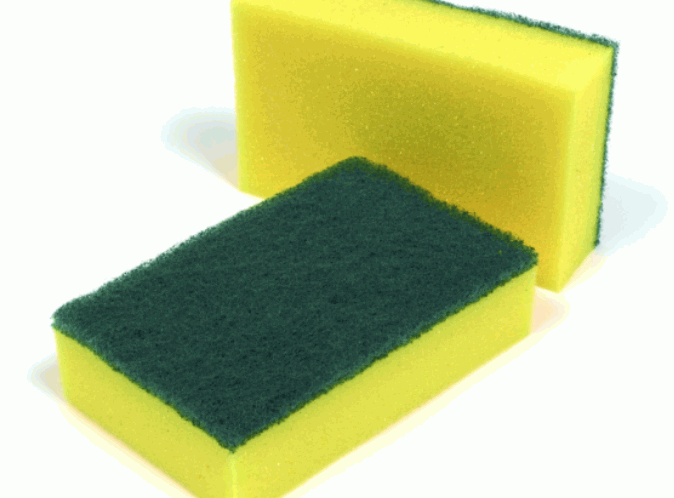
Mild Detergent
A mild detergent is recommended as part of the cleaning solution for solar panels to ensure the glass remains clear and free of streaks while effectively removing dirt and grime.
In terms of selecting a suitable mild detergent for cleaning solar panels, opt for options that are gentle and eco-friendly, avoiding harsh chemicals that can potentially damage the panel's surface over time.
- Choose mild dish soap or a specialized solar panel cleaning solution specifically formulated to maintain the integrity of the panels.
- Avoid using abrasive cleaners or detergents containing ammonia, bleach, or other strong chemicals that may have a detrimental impact on the panel's efficiency and longevity.
To prepare the cleaning solution, mix a small amount of the mild detergent with warm water in a bucket or spray bottle. It is crucial to use a diluted solution to prevent residue build-up and ensure a spotless finish on the solar panels. Apply the solution generously to the panels using a soft sponge or cloth, gently scrubbing to loosen dirt and grime without scratching the glass surface. Rinse thoroughly with clean water and allow the panels to air dry for optimal results.
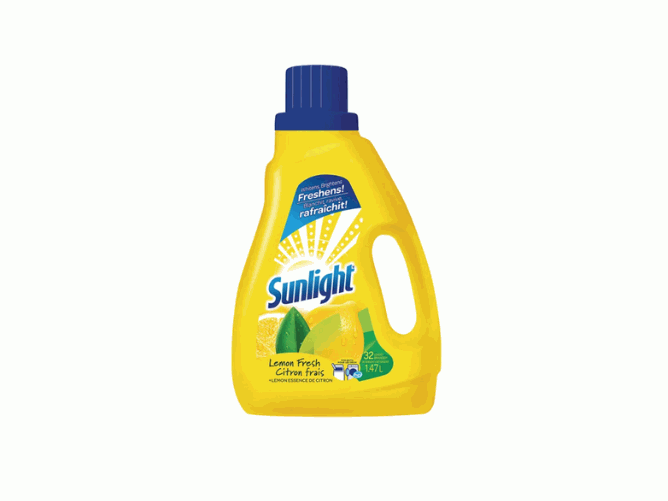
Hose Or Pressure Washer
A hose or a pressure washer can be used to rinse off the cleaning solution and any loose dirt from the solar panels, ensuring they are thoroughly cleaned.
When using a hose, it's important to adjust the nozzle to a gentle spray to avoid causing any damage to the panels. A pressure washer can be a more powerful option, but it should be set to a low-pressure setting to prevent the risk of cracking or scratching the solar panels.
Before starting the cleaning process, it's advisable to check for any cracks or damage to the panels. Always ensure the panels are cool to the touch to avoid thermal shock when applying water. Safety goggles and non-slip footwear are recommended while working with water and cleaning agents to protect yourself from potential hazards.
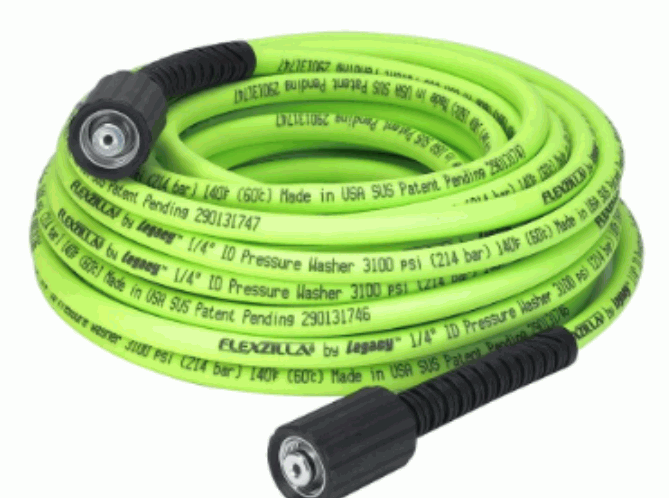
What Is the Best Method for Cleaning Solar Panels?
The best method for cleaning solar panels can vary depending on the setup and accessibility of the panels, with both manual and automated cleaning methods offering distinct advantages.
Manual Cleaning
Manual cleaning involves using tools like a soft brush, non-abrasive sponge, and mild detergent to clean solar panels by hand, ensuring thorough maintenance.
- First, it's essential to remove any loose debris and dust from the panels using a soft brush. This step helps prevent scratching the surface during further cleaning.
- Next, wet the non-abrasive sponge with water and a small amount of mild detergent to gently scrub the panels, focusing on any stubborn stains or dirt buildup.
It is crucial to rinse the panels thoroughly with clean water to remove any soap residue. Avoid using harsh chemicals or abrasive materials that can damage the panels' surface and decrease their efficiency.
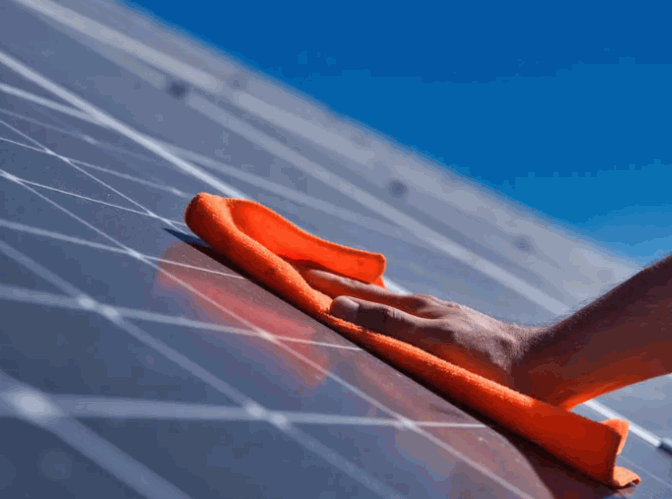
Automated Cleaning
Automated cleaning systems are designed to clean solar panels efficiently without human intervention, making the cleaning process quicker and often more thorough.
These systems utilize advanced technologies such as sensors, robotic arms, and water jets to ensure the removal of dirt, dust, and debris from solar panels. One of the key benefits of automated cleaning systems is their ability to operate on a preset schedule, ensuring regular maintenance without the need for manual oversight.
Various types of automated cleaning systems are available, including stationary systems that move along a track and portable systems that can be positioned directly on the panels.
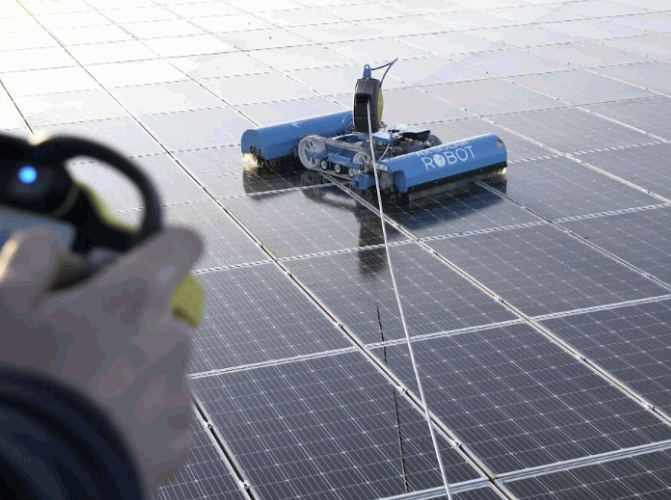
What Precautions Should be Taken When Cleaning Solar Panels?
Taking proper precautions during the cleaning process of solar panels is crucial to ensure both personal safety and the longevity of the panels, including adhering to manufacturer instructions and electrical safety guidelines.
Turn Off The Power
Before starting the cleaning process, it is essential to turn off the power to the solar panels to prevent electrical hazards and ensure safety.
Failure to shut off the power source before cleaning solar panels can lead to serious injuries or even fatalities due to the risk of electric shock.
- In terms of ensuring the safe shutdown of solar panels, the first step is to locate the main power switch or circuit breaker that controls the panel's electricity supply. Turn off this switch to disconnect the panels from the power source.
- Always double-check that the panels are not generating electricity before proceeding with the cleaning process. This step is crucial to minimize the potential hazards while maintaining the efficiency of the panels.
Wear Protective Gear
Wearing protective gear such as gloves and safety glasses is important during the cleaning process to protect yourself from potential hazards and ensure the safe handling of cleaning tools and solutions.
Aside from gloves and safety glasses, wearing appropriate footwear can also be crucial to prevent slipping or falling while working on solar panels. Consider using a dust mask to avoid inhaling any particles or fumes during the cleaning process.
When selecting protective gear, opt for items that are specifically designed for working with solar panels to ensure the best fit and protection. Ensuring that your gear is in good condition and properly maintained is equally important for your safety.
Choosing the right protective gear not only safeguards your well-being but also enhances your efficiency and effectiveness in maintaining solar panels for optimal performance.

Avoid Using Harsh Chemicals
It is crucial to avoid using harsh chemicals during the cleaning process as they can damage the surface of the solar panels and reduce their efficiency.
When harsh chemicals come into contact with solar panels, they can degrade the protective coating and potentially lead to cracks or scratches. These damages not only impact the aesthetics of the panels but can also interfere with their functionality by obstructing sunlight absorption.
Using organic cleaning solutions, such as a mixture of water and vinegar, is a safer alternative that effectively removes dirt and grime without causing harm to the panels. Gentle cleaning techniques like soft brushes or sponges can help maintain the longevity of the panels without risking any structural harm.
Are There Professional Services Available For Cleaning Solar Panels?
Yes, there are numerous professional services available for cleaning solar panels, often offered by solar installation companies and other specialized solar companies to ensure efficient and safe cleaning.
These professional cleaning services play a crucial role in maintaining the optimal performance of your solar panels. By having experts regularly clean your panels, you can ensure that they are free from dirt, debris, and other obstructions that can reduce their efficiency.
Professional cleaning services often use specialized equipment and cleaning solutions that are safe for both the panels and the environment. This not only extends the lifespan of your solar panels but also helps in maximizing the energy production from your solar system.
What Are Some Tips For Maintaining Clean Solar Panels?
Maintaining clean solar panels is essential for optimal solar panel efficiency and long-term performance, and some helpful tips include regular inspections, proper cleaning techniques, and timely maintenance.
Regular inspections play a crucial role in detecting any potential issues early on, such as dirt buildup or shading from nearby objects. By identifying these issues promptly, you can address them before they significantly impact your solar panel's output.
In terms of cleaning, using a gentle soap solution or specialized solar panel cleaning products along with a soft sponge or cloth can effectively remove dirt and debris without damaging the panels. Scheduling timely maintenance with a professional can help ensure all components are functioning correctly and prevent any unexpected breakdowns.


